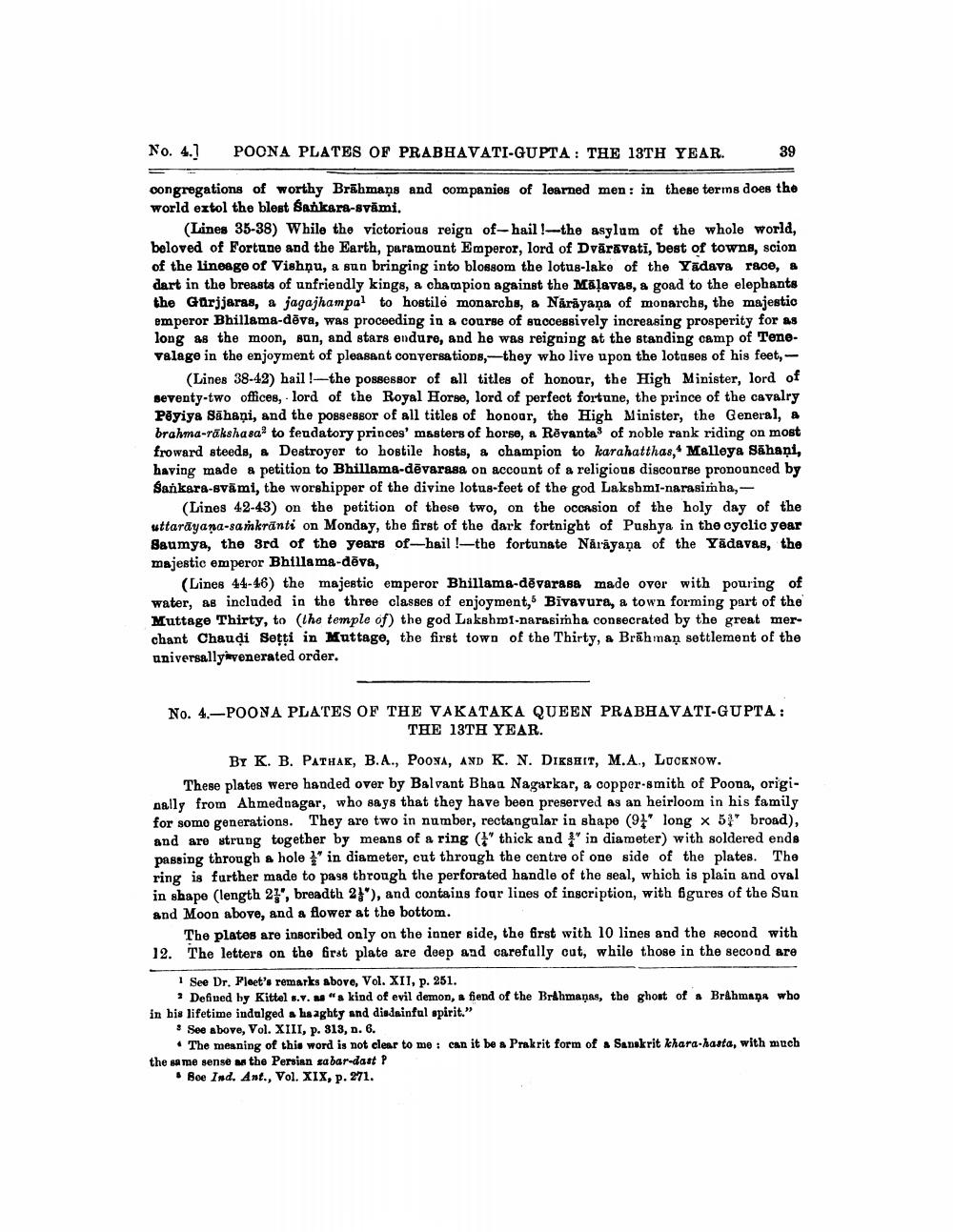________________
No. 4.7
POONA PLATES OF PRABHAVATI-GUPTA : THE 13TH YEAR.
39
oongregations of worthy Brāhmans and companies of learned men: in these terms does the world extol the blest Sankara-svāmi.
(Lines 35-38) While the victorious reign of-hail!--the asylum of the whole world, beloved of Fortune and the Earth, paramount Emperor, lord of Dvārāvati, best of towns, scion of the lineage of Vishņu, a sun bringing into blossom the lotus-lake of the Yadava race, & dart in the breasts of unfriendly kings, a champion against the Māļavas, a goad to the elephants the Gurjjaras, & jagajhampal to hostile monarchs, a Nárāyaṇa of monarchs, the majestio emperor Bhillama-dēva, was proceeding in a course of successively increasing prosperity for as long as the moon, sun, and stars endure, and he was reigning at the standing camp of Tenevalage in the enjoyment of pleasant conversations, they who live upon the lotases of his feet, -
(Lines 38-42) hail !--the possessor of all titles of honour, the High Minister, lord of seventy-two offices, lord of the Royal Horse, lord of perfect fortune, the prince of the cavalry Payiya Sāhani, and the possessor of all titles of honour, the High Minister, the General, a brahma-rākshasa to feudatory princes' masters of horse, a Rēvantas of noble rank riding on most froward steeds, & Destroyer to hostile hosts, a champion to karahatthas," Melleya Sāhani, having made a petition to Bhillama-dēvarasa on account of a religious discourse pronounced by Sankara-svāmi, the worshipper of the divine lotus-feet of the god Lakshmi-narasimha,
(Lines 42-43) on the petition of these two, on the occasion of the holy day of the uttarāyana-saņkrānti on Monday, the first of the dark fortnight of Pushya in the cyclic year Saumya, the 3rd of the years of-hail !-the fortunate Nārāyaṇa of the Yādavas, the majestic emperor Bhillama-döva,
(Lines 44-46) the majestic emperor Bhillama-dēvarasa made ovor with pouring of water, as included in the three classes of enjoyment, Bivavura, a town forming part of the Muttage Thirty, to the temple of the god Lakshmi-narasimha consecrated by the great merchant Chaudi Setti in Muttage, the first town of the Thirty, a Brāhman settlement of the universally venerated order.
No. 4.-POONA PLATES OF THE VAKATAKA QUEEN PRABHAVATI-GUPTA:
THE 13TH YEAR.
BY K. B. PATHAK, B.A., POONA, AND K. N. DIKSHIT, M.A., LOCKNOW. These plates were handed over by Balvant Bhan Nagarkar, a copper-smith of Poona, originally from Ahmednagar, who says that they have been preserved as an heirloom in his family for somo generations. They are two in number, rectangular in shape (97" long x 5" broad), and are strung together by means of a ring (!" thick and " in diameter) with soldered ends passing through a hole in diameter, cut through the centre of one side of the plates. The ring is further made to pass through the perforated handle of the seal, which is plain and oval in shape (length 2)", breadth 21), and contains four lines of inscription, with bgures of the Sun and Moon above, and a flower at the bottom.
The plates are inscribed only on the inner side, the first with 10 lines and the second with 12. The letters on the first plate are deep and carefully cut, while those in the second are
1 See Dr. Pleet's remarks above, Vol. XII, p. 251.
* Defined by Kittel s.. "s kind of evil demon, a fiend of the Brahmaņas, the ghost of BrAhmaņa who in his lifetime indulged a heaghty and disdainful spirit.”
* See above, Vol. XIII, p. 813, n. 6.
• The meaning of this word is not clear to me : can it be a Prakrit form of Sanskrit khara-hasta, with much the same sense as the Persian sabar-dast P
. Bee Ind. Ant., Vol. XIX, p. 271.




